Friday, August 25, 2006
Thursday, August 17, 2006
DVD watching in Dili
Tristam Shandy: A Cock and Bull Story
Mrs Henderson Presents
Man to Man
Keeping Mum
The Constant Gardener (a profoundly disappointing film after having read the enjoyable novel on which it was based)
Sherlock Holmes and the Case of the Silk Stocking - BBC production – excellent
Girl with a Pearl Earring - excellent
France
Intimate Strangers - good
New Zealand
Rain - excellent
Israel
Campfire - excellent
USA
The Baxter
House of D
The Libertine
The Life Aquatic with Steve Zissou
Elizabethtown
Head Above Water
Good Night, Good Luck - good
Saving Face – excellent
Just Like Heaven – excellent
Capote – excellent
We have also been watching season 2 of Desperate Housewives, season 5 of the West Wing, season 1 of Little Britain, and struggling to watch due to poor quality, the final seasons of both Six Feet Under and Queer as Folk. We are waiting for the DVD shop in Kolmera to get in new stock of these television programs so that we can swap our poor quality DVDs for ones that are watchable!
Wednesday, August 16, 2006
Children’s war games
Tuesday, August 15, 2006
I am not Timorese


Monday, August 14, 2006
Cleaning up Dili
Saturday, August 12, 2006
Being cruised at Hotel Timor
As we sat waiting inside the Hotel Timor, a Timorese man whom we both know from the DVD shop in Kolmera approached us. As we had not seen him since our return last month, Daniel had assumed that he had fled the country but it turns out that he is working as a translator for the Australian military. He asked if he could join us and sat down.
We asked where he had learnt English and he said he had taught himself. His home was similarly burnt down and his sister’s cars and motorbikes were also burnt, all because they are from the east. As with Tia Martha, they are likewise living at the IDP camp opposite the hotel. His parents still live in Los Palos and he has four sisters and three brothers. One brother is in fact the President of a new political party in Timor which intends to contest the national elections next year.
Daniel excused himself to go to the toilet, and within seconds of him leaving, our friend followed him. I was immediately suspicious as Daniel had told me that he believed our friend had been hitting (quite seriously) on him a number of times in the DVD shop, even asking him out 'for some fun' once. We both suspected he was gay but I never thought think he would try hitting on Daniel so blatantly in front of me! Momentarily I worried how I would warn Daniel, before he reappeared. Apparently Daniel had given him a friendly, but apologetic, smile in the toilets and gone on his way.
When our friend returned rather quickly from the toilet, Daniel went to call Tia Martha. She and her family were at the IDP camp across the road. It was the first time Daniel had seen one of the camps from the inside. Tia Martha said that although her house hadn’t been destroyed yet, she fully expected it to be so. She has another house in Becora, a suburb on the eastern outskirts of Dili which bore a disproportionate brunt of the violence in May and June.
In the meantime, I was left to make small conversation with the man who had tried to proposition my partner in the toilets while I sat outside! I wondered if now would be the right time to talk about the television series Queer as Folk as a hint that I knew what he was up to.
Friday, August 11, 2006
The season of anin-boot
A necessary accessory in Timor is a pair of large, wrap around sunglasses to protect one’s eyes, not only from the damaging rays of the sun, but also, from the dust and any potential infections. At this time of year, many people are afflicted with matan-mean (red eyes or conjunctivitis), and having experienced two such episodes myself, the purchase of a new pair of sunglasses while on holiday in Cairns, was a worthwhile investment.
With the dust however, comes a commonplace Timorese practice that speaks volumes about the lack of environmental awareness amongst the general population. People hose down dusty roads with the precious little water this drought prone country has. The dust problem not only causes matan-mean but contributes to the depletion of the country’s water supply, which gives even more weight for the need to build paved roads and footpaths. The photo below was taken outside the Ministry of Saúde (Health) in Caicoli. The irony of this photo is not lost on me.
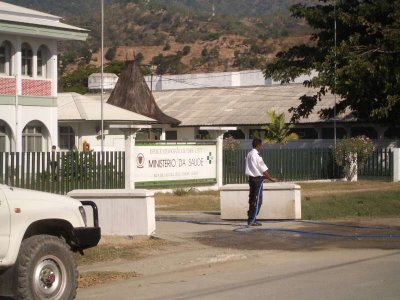
Category: Timor-Leste (East Timor)
Thursday, August 10, 2006
Tia Martha, one of Timor’s finest tais makers
Tia Martha lives in Bebonuk, a suburb in the Komoro area of Dili, 4km west of town. Daniel telephoned her to get instructions on how to get to her house. We caught a taxi to the SD tingat school and then asked various people on the street where Tia Martha’s house was. As we walked down the street we came upon this graffiti. So the GNR do have friends in Timor!
We also passed a small group of recently destroyed small shops and noticed a number of burnt down houses. A young man led us for the final leg of the walk to Tia’s house. We weaved in and out of people’s backyards and passed a couple of women at a water pump skinning a very dead and rigid dog. Ah hah, it is confirmed, the Timorese do eat dogs!
Upon entering Tia Martha’s veranda she greeted me warmly and had remembered me from the workshop. Two younger women were sitting on the ground weaving tais on order from Rede Feto. Tia’s husband, various children and grandchildren were also milling about. We sat down on plastic chairs and I immediately noticed the beautiful purple and green tais on the table. They just happen to be my favourite colours! Tia proceeded to show us her work including a bunch of personalised tais for Rotary Australia members who never collected their scarves. I commented to Daniel that I would contact Rotary myself and advise them that their unpaid order was still waiting collection three months later. I assumed that the Rotary members had visited Timor just before all hell broke lose, and as a result were not able to collect their order.
Tia showed us the material she uses to weave the tais which I suspect is a polycotton. It comes from China and isn’t cheap. A young girl was winding the material into balls and I asked to have a look at the colours available. I chose a selection and then Daniel explained in Tetum what I wanted. It was an experience for Daniel to explain how many metres and what combination of colours to use.
Tia said what I wanted was possible and they would be ready in early September. She would return to Oecusse the following Monday and bring back one of her daughters to help make the order. It takes three days for a woman to weave one small scarf and I had ordered very large wraps.
Once we had negotiated a price, left a deposit and promised to return on Saturday in order to pay in full. One of Tia’s sons escorted us back to the main road as there were now a number of groups of young men congregating on the street, some with slingshots. He said that the area had experienced its fair share of troubles and he didn’t want us to run into any trouble. We admittedly felt a little intimidated but diffused any potential problems by greeting people as we passed.
We made it out of the neighbourhood safe and sound back to the main road to catch a taxi to town. It’s a shame that Tia Martha doesn’t have a wider audience for her tais as most visitors to Timor simply head to the ramshackle tais market in Kolmera. The quality of the material used here can vary and I wonder if the women get to see any of the profits from their craftwork or whether the (mostly) men who sell the tais, keep it for themselves. Due to these concerns, I made the decision to seek out Tia Martha despite it being a more time consuming (and heart pounding) undertaking.
When Daniel returned to work he heard that there had been fighting in Bebonuk some time after lunch and at least one person was stabbed, which explains the presence of so many men on the streets in Tia Martha’s neighbourhood.
Wednesday, August 09, 2006
The morning call to prayer
Upon waking I told Daniel about hearing it and he too had likewise heard the call. We guessed that it must have come from Dili’s Muslim mosque in Kampung Alor which borders Ai-tarak-laran. Living in different parts of a city gives one an opportunity to experience its diversity, no matter how small that diversity might be.
Tuesday, August 08, 2006
When the modern meets the feudal
For the past year, my partner Daniel worked for a leading legal human rights NGO in Timor; today just before he resigned, he learned that the Director sent an email to AVI telling them that Daniel’s services were no longer required and that the new six month contract they were currently in negotiation about was not necessary. Why? Because both the Director and many of the mainly male Timorese staff believe that one male colleague’s possession of child pornography on its organisation’s computer (a fact he does not deny nor try to justify) merely warrants a warning and that Daniel’s protestations that it constituted a serious offence that should be met with the sacking of the offender, meant that the head of a Timorese human rights NGO decided to get rid of the whistleblower in order to protect the offender and anyone else like him that works at this so-called human rights NGO.
The offenders first documented warning was of the sexual assault of a colleague which came on top of an undocumented warning of being so drunk that he was unable to drive colleagues to the districts to undertake human rights training, that he sent a friend and inexperienced driver in his place. This event potentially endangered the lives of his colleagues. Furthermore, this person engages in corrupt work practices such as abusing the organisation’s resources. But when the Director does likewise, who is going to hold him to account?
Within this organisation there are two units which work on issues of sexual assault of children and women. From experience, they have come to learn that within Timorese society, the sexual assault of children is only taken seriously when a girl child is vaginally raped with a male’s penis. Everything else is considered of no real consequence. The reason being that within traditional Timorese society, girls and women are considered simply an asset, not much different from owning a cow or a pig, except that their (bride) price brings in more income. When a girl’s virginity is “stolen”, her price is markedly reduced. If the family (father and his brothers) decides not to pursue the assault through the formal (modern) justice sector, then they will do so via customary law which inevitably awards the girl child’s family animals in compensation for their “loss”.
Daniel has been told by some of his mostly male Timorese colleagues that he is simply a trouble maker; that he should just chill out, have fun and stop trying to make things difficult. Others (notably most of the Timorese women) are appalled that the organisation they work for, an organisation whose mission is to uphold the rule of (modern) law and human rights conventions, could, when it comes to its own (male) staff, fail to hold them accountable to these very same principles.
Compounding the situation is a highly stratified traditional Timorese culture. Despite the fact that most of the Timorese staff hail from the privileged class and hold university degrees in law from Indonesia, they cannot escape their deeply entrenched patriarchal culture as exemplified in the relations between the ema boot and ema kiik. The staff simply will not question the authority of the director even when they feel he fails to show any leadership on such a serious issue as child pornography. They do not see it as their place to do so. Timorese are also loath to confront problems head on, instead employing the very strategy which freed them from their Indonesian oppressors: passive resistance. Furthermore, with a high unemployment rate, they cannot afford to lose their jobs and confronting an ineffectual Director, might very well get them fired. Thus, any challenges to corruption and contravention of human rights standards, has to come from the malae, but even here there are serious problems.
The other three malae women Daniel currently works with believe the possession of child pornography is a serious matter. Only one of these women has been working at the NGO for more than a year, the other two having commenced work within the last month (Daniel is currently the second longest serving malae and during his time there said goodbye to five malae and three Timorese, yet the latter outnumber the former by 3 to 1).
A number of Daniel’s male Timorese colleagues have told him that he is nothing like the other malae they have worked with. That none of the previous malae “caused trouble” and as a consequence enjoyed working with them. But how many of these previous malae really showed any real commitment to the organisation, their colleagues or Timor? How many of them have been like Daniel, worked as a volunteer for a year and then after being mandatorily evacuated due to the deteriorating security situation is told that the program he is with is suspended under further notice, return to Timor under their own steam to work on a greatly reduced allowance because they passionately care about the organisation, their colleagues and the work they do? How many malae are willing to put their neck on the line for an issue or cause they believe in? Many internationally paid malae in Timor seek nothing more than there own glorification. The irony is, Daniel’s Timorese colleagues believe that it is these very same malae who care about the organisation!
How can the work of a leading Timorese NGO be reconciled with the behaviour of some of its staff? Why should the community listen to what these very people have to say when they themselves contravene these very principles? When these people teach its citizens about the law and human rights conventions such as the Convention on the Rights of the Child and then return to the office to view child pornography, sexually assault or harass their female colleagues? What is the consequence of impunity within a human rights NGO which publicly condemns it?
The Director can argue that it is not a crime in Timor to possess child pornography. The Indonesian Penal Code (to which Timor still adheres) is ambiguous on possession but clear on manufacturing and distributing child pornography. However, the new Timorese Penal Code which is waiting ratification by the government, states that the possession of child pornography is punishable by one to six years imprisonment. Shouldn’t this legal human rights NGO uphold both the Convention on the Rights of the Child and the local law which will soon come into force?
Complicating matters is the fact that it was malae staff who decided to hand over the reigns of the organisation as a malae to a Timorese managed one. It certainly looks good on one’s CV when you can say that you “successfully transitioned” an NGO to local staff, while you then never get to experience the consequences of this decision but do go on to continue climbing the career ladder of your chosen field. What potential Western employer is going to telephone a local NGO in Timor and ask whether the transition was a success, when the person they will inevitably talk to (the Director) is the very person who should never have been elevated to the position in the first place? And who subsequently went on to sexually harass one of his junior female colleagues and admitted to her that he had on at least one occasion, had sexual relations with a sex worker while attending a conference on human rights in Asia?
Ultimately, one has to draw the line somewhere. Capacity building is a fraught endeavour when the people involved are from two very different cultural and educational backgrounds and all to frequently with conflicting motivations. Both the NGOs we have worked for include many Timorese who are not terribly interested in the issues the organisation espouses, and certainly are not passionate about human rights, but simply need a job to support themselves and their substantial extended families. Given that the NGO field in Timor is one of the biggest (and one of the best paid) industries, it is inevitable that many of the staff do not work for an organisation with the same level of commitment to the principles of that organisation that one might expect in the West where we have more opportunities and a far greater range of industries to chose from for paid employment. In fact in the West, the NGO sector is one of the worst paid industries and tends to attract highly motivated and passionate people who are prepared (and able) to sacrifice a more highly lucrative position elsewhere. In Timor, the situation is frequently the reverse.
Just imagine a modern Westerner trying to capacity build a feudal European from the medieval period about human rights. (Take just one example, Children’s Rights. In Western feudal societies, children were considered mini adults and sexual abuse was rife; there was simply no understanding about its consequences. With the benefits of education and research, we now know that it is incredibly damaging to the child and the future adult they will become.) Now throw in conflicting motivations and a multi language environment and you get a pretty good sense of how difficult and perhaps even futile it is. As one of our malae friends says, the Timorese have a very good theoretical understanding of human rights but the gap between theory and practice is enormous. I would also add that the same applies (albeit it manifests itself in different ways) to many of the malae who come here. One could even argue that given all the privileges and education bestowed on malae, it is they who should be held most accountable.
Human rights in Australia, Portugal and Timor
Only two weeks ago I was flicking through Amnesty International’s (AI) state of the world’s human rights report for 2006. I decided to focus on those countries which were of interest to me including my own, Timor and Portugal.
As to be expected, AI’s criticism of Australia focused on our appalling treatment of asylum seekers and refugees; the continuing third world conditions that our indigenous people live in and their high homicide and incarceration rates; and counter-terrorism laws which potentially have negative impacts on human rights. I fully support AI’s criticism of my country of birth. It is shameful!
Timor was criticised for its weak justice system including allegations of police abuses such as arbitrary detention and ill-treatment, as well as a lack of judges, prosecutors and defence lawyers; also the ongoing lack of justice for victims of the 1999 independence referendum.
Portugal was criticised for its ill-treatment of suspects by police officers, the lack of law enforcement training in the use of force and firearms and the concerns this raises about the country’s failure to comply with international law and standards. At least three people were killed as a result of lethal force (two by the GNR), again raising long-standing concerns about the possible unnecessary or disproportionate use of force.
It seems a little crazy to me for the Timorese government to ask for men from a force in another country with human rights violations on its record to take over from a similarly criticised force within its own country! I certainly wouldn’t want Timor to ask Australia for immigration advisors (anyone that is from the current government or bureaucracy at DIMIA).
So is it any wonder that the Timorese have more faith in Australia’s security forces than its own or its former colonial masters?
Ending the cycle of violence
How long will it take for the Timorese to understand that violence met with violence only begets more violence? That what goes on within the family likewise goes on within the wider Timorese community, as the last few months have clearly shown.
When will Israel and Hezbolah likewise learn this same lesson? When will the Tamil Tigers and government of Sri Lanka? When will the Americans, the Australians and British and their “War on Terror”; the Sunni and Shiite Muslims in Iraq; and the Taliban and warlords in Afghanistan?
Monday, August 07, 2006
Flora gets a job
After lunch Daniel and I visited the ANZ bank in order to cash his pay cheque and while waiting for the cash to be counted, Flora walked out with a colleague from the rear offices. She looked so smart in a pair of black trousers with a neatly pressed striped shirt that for a moment I thought I was back in the Melbourne CBD! I kissed her on both cheeks and congratulated her on her success.
Sunday, August 06, 2006
Virginia’s 21st and Raphael’s 43rd birthday celebration
Instead of the attention being on Virginia and Raphael, however, I felt the attention was still on us as the honoured malae guests. The entire conversation was dominated by Raphael and Daniel. It doesn’t help that my Tetum is not as advanced as Daniel’s but it is a fact that in such situations, the men tend to hold court. I find it an incredibly frustrating aspect of Timorese culture. But Raphael is a very good man and I have to remind myself that he cannot so easily overcome the deep patriarchy he was born and raised in.
An interesting comment made by Raphael was that he and Domingas wanted to return to living in the districts once the children had grown up and left home. He said that it was very difficult to grow food in Dili due to the lack of land and that being dependent on money to buy food was an incredible challenge.
I asked the littlies if they would like their photo taken and they immediately became excited by the prospect. It is very entertaining taking photos of kids on a digital camera as they get to see the results immediately and think it’s hilarious to see themselves reflected back on screen. Then I proceeded to take photos of the birthday “girl” and “boy” and “our” family. This week I will go to the photography store in the centre of town and get copies printed out to give to everyone I took a photo of. Timorese pride photos of themselves as owning a camera is simply out of their reach.
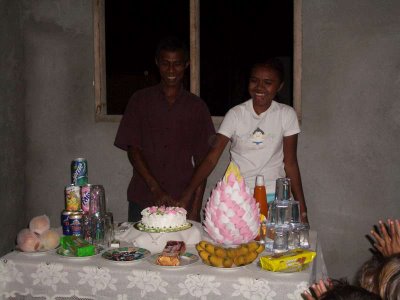 Raphael and Virginia celebrate their 43rd and 21st birthdays respectively
Raphael and Virginia celebrate their 43rd and 21st birthdays respectively
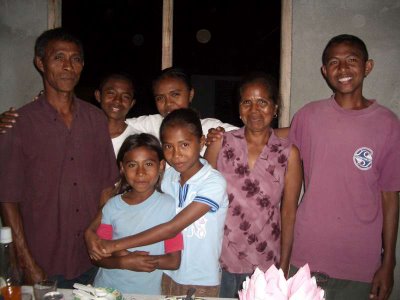 "Our" family: Raphael, Joel, Virginia, Domingas, Joanico; Front row: Abina and Zalia; Absent: Atoby
"Our" family: Raphael, Joel, Virginia, Domingas, Joanico; Front row: Abina and Zalia; Absent: Atoby
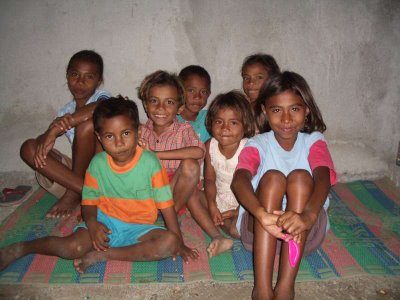 Zalia, unknown boy, Atito, Bebe, Jenny, Abe and Abina
Zalia, unknown boy, Atito, Bebe, Jenny, Abe and AbinaAbout an hour after the celebration began, the power went off and as the generator is currently broken, people scrambled around in the dark looking for candles to light. We decided it was a good time to bid goodnight. As we had also spent the night before with “our” family, I wanted to do my own thing tonight. I often feel very guilty about not spending more time with them but the need for privacy and time out, combined with feeling exhausted with living in Timor in general and the fact that family get togethers revolve around conversations between Raphael and Daniel, I shouldn’t beat myself up about it!
Before we could leave, Raphael insisted that we take a bunch of bananas with us which they had cut from a palm in their garden. They had originally done so earlier in the week with the intention of giving them to Daniel when he was sick. Domingas and Raphael had journeyed into town the previous Monday to seek Daniel out at the hospital as the day before I had told “our” family that he was sick with a virus. I didn’t expect them to take thirteen bananas to town in search of Daniel when he had already returned to work anyway! We tried to take only two of the bananas because after all, we are overfed Westerners and they are all, without exception, underweight Timorese. Moreover we can afford to buy our own bananas. But Raphael wouldn’t hear of it so we reluctantly took all thirteen home.
We watched the last episode of Spooks season 3 that we have with us in Timor (while in Australia we sent the final DVD containing the last two episodes in the series back to Melbourne thinking we wouldn’t be able to watch it in Timor as I had damaged the LCD in the screen of our laptop). As another one of my favourite characters was written out of the series, and as Daniel fell asleep before the end, I was suddenly overcome with sadness at the possibility of leaving “our” family just when we were growing closer. Ever since our evacuation and our regular telephone calls to Raphael inquiring as to their situation, not to mention our arranging for delivery of food, “our” family have become noticeably more attentive towards us. I think finally after a year, they know that we care about them and many of the walls between us have been dismantled. It’s a lesson one learns from living here: it takes a long time for trust between malae and Timorese to take root.
Saturday, August 05, 2006
Kari aifunan (The scattering of flowers)
One young woman and Senyor Raphael tried to light a bunch of small white candles, much like the ones you see in a Catholic church, but with the strong wind, it took many attempts. Finally lit, we placed them on a stone ledge to burn. Raphael said that it allowed us to remember all our grandparents who had passed on and that conducting such a ceremony was for the benefit of those who remain behind, so that they can again be at peace.
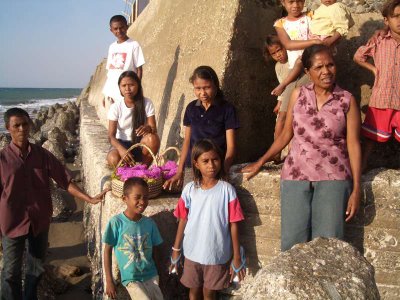 Members of "our" family and their kin with the basket of flowers for the kari aifunan down at Raikotu beach, Dili
Members of "our" family and their kin with the basket of flowers for the kari aifunan down at Raikotu beach, Dili
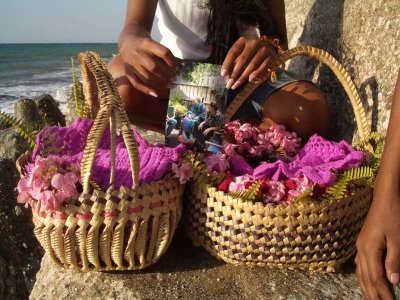 The basket of flowers with a photo of my Nanna (centre) on her 90th birthday in February (my Aunt Jan is to the right in the photo).
The basket of flowers with a photo of my Nanna (centre) on her 90th birthday in February (my Aunt Jan is to the right in the photo).
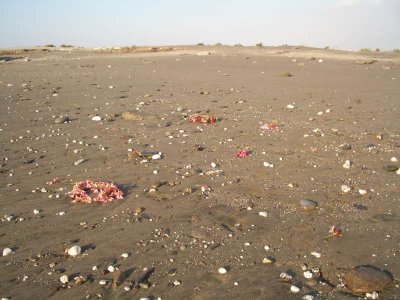 Once sent forth on the outgoing tide, the aifunan (flowers) initially come back to shore
Once sent forth on the outgoing tide, the aifunan (flowers) initially come back to shore